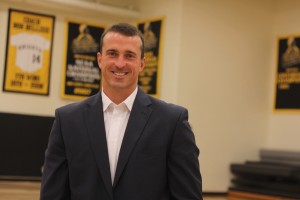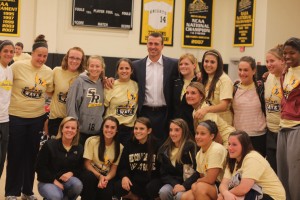Chris Herren talks to students about drugs and alcohol from personal experiences
By JACKSON WANG
Sports Editor

On September 18, former NBA player and college basketball standout Chris Herren came and spoke to student here at Saint Rose about drugs and alcohol.
Herren spoke to students about his drug addition and what lead to the pitfall in his basketball career. Herren shared his story to help students avoid the mistakes that he made during his life.
“I was really impressed by the speaker,” said Elizabeth Corey, a residential assistant. “I was required to go as an RA. I was glad to see all the student-athletes there to see it and the whole residential staff.”
About 15 years ago, Herren was sitting in a gymnasium listening to a former NFL player talk about drugs and alcohol, a very similar situation to what most student athletes were experiencing listening to Herren instead.
Herren didn’t care about what that man had to say and didn’t pay attention. Today, Herren wished he had listen to what that man had to say because it could have prevented the downfall that Herren went through.
He told students this story because he believes it’s important for students to listen to what he had to say, so other students can avoid making the same mistakes as Herren made in his life.
“I think that Chris’ speech really hit home with our student-athletes about the dangers of drugs and alcohol,” said Mike Perno, assistant men’s basketball coach. “It was very important that we get someone who our students could relate to.”
Herren was a basketball legend from Fall River, Massachusetts that played at Boston College before transferring to at Fresno State. His first experience with drugs was when he was at Boston College.
One night after a photo shoot, Herren went back to his dorm to find a line of cocaine on his desk. His roommate was doing cocaine and eventually was talked into doing a line of cocaine by a friend.
“I didn’t know it was going to take 14 years to stop,” said Herren. “That one line lasted 14 years.”
Herren failed his first drug test at age eighteen and then failed it two more times. Soon after failing the drug test for the third time, he was dismissed from the team.
Herren then transferred to Fresno State to play basketball. In his junior year, the athletic director at Fresno State told him if he stayed drug free, then he would be a first round NBA draft pick, make millions of dollars and be living his dream.
At that time, drug was most influential than his dream. Fresno State tried to help by sending Herren to a rehab center in Salt Lake City, but Herren was naïve about the help at the time.
Herren would soon get drafted by the Denver Nuggets and play a season for them before getting trade to the Boston Celtics. At this point, Herren was living his dream, playing for the Celtics and playing in front of his hometown.
Still drugs would be such a big part of his life and it was costing him $25,000 to $30,000 a month. This also cost him an opportunity to be the starter for the Celtics as well.
Soon after, Herren would play basketball for multiple teams overseas. While overseas, Herren began to use heroin and that affect his decisions to play basketball for certain teams. Again, opportunities were blown due to his use of drugs.
In 2004, Herren was arrested and charge with possession of heroin and driving under the influence in Portsmouth, RI.
It wasn’t until 2008 when Herren finally decide to go to rehab to help with his drug addition. He made this decision after he crashed his car and died for 30 seconds. The doctors kept working on him and eventually he came back to life.
Herren went to rehab in New York City. He did eleven months of treatment before coming completely sober. Since he completed his drug rehabilitation in 2008, Herren has been sober and drug-free.
“Who I was at 18, 19 and 20, I look at with disgust today,” said Herren. “I never thought I would turn out a heroin addict.”

After his speech, Herren was willing to talk to any student that wanted to talk to him about related problems and other issues as well. Herren also told the crowd to speak up to people that have drug problem because it can save their lives.
“I believe seniors and juniors are set up to help the freshmen and sophomores,” said Herren. “I believe you are who you hang out with.”
Herren has spoken his story hundreds of times and is always willing to help people if they have an addition problem. Today, Herren he runs a nonprofit organization that helps people who need to go to rehabilitation but can’t afford it.
“I think this was an opportunity tonight to hear about blow opportunities,” said Herren. “From this day forward it’s about making better decisions.”
Herren also has a book out called Basketball Junkies, and ESPN’s 30 For 30 filmed a documentary about Herren’s career that will air this fall.
“[It’s] a story that our student-athletes will never forget and also refer back to when put into uncomfortable situations pertaining to drugs and alcohol,” said Perno. “Chris is someone that everyone can learn from and we were very appreciative of having the opportunity to bring him on campus for our drug and alcohol program.”

